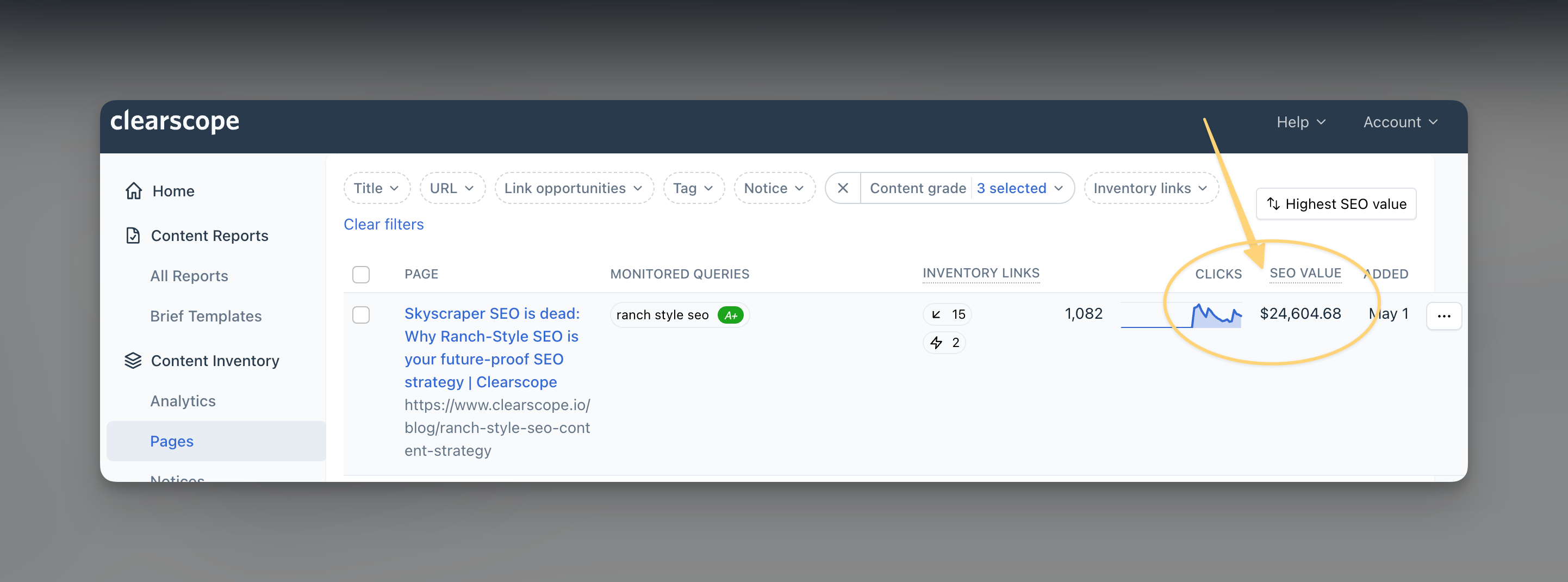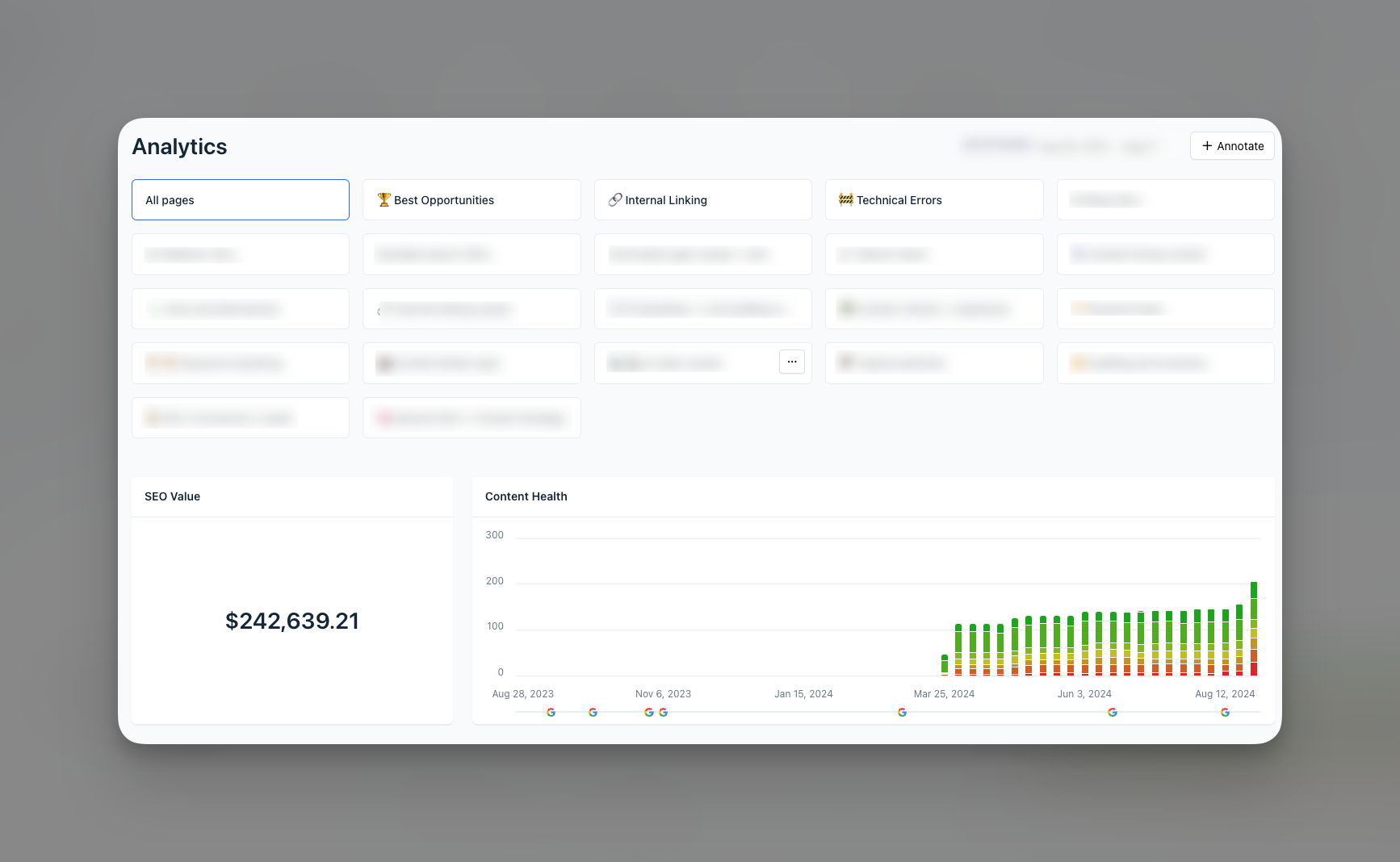What is SEO value and why it matters
Topic: SEO
Published:
Written by: Bernard Huang
TL;DR: What is SEO value?
SEO value is an estimate of the money generated by the organic traffic that your article generates.
When considering the SEO value of your content library as a whole, it’s a metric that measures potential impact of your search engine optimization (SEO) efforts on your website’s performance.
It represents the worth of your site’s visibility and ranking in search engine results pages (SERPs), reflecting how effectively your site attracts organic search results and converts visitors into customers.
This metric is crucial for understanding the return on investment (ROI) from your SEO strategy, helping you measure the success of your content marketing and digital marketing efforts.
How Clearscope defines and calculates SEO value as a metric
At Clearscope, our platform calculates your SEO value automatically by analyzing a few data points:
Organic website traffic that the actual web page receives
The estimated cost-per-click (CPC) of the most relevant keywords the page ranks for
This approach provides an estimated SEO value per page based on ranking keywords... in the same way as if they were part of a paid search campaign.
The Clearscope SEO value calculation bridges the gap between organic and paid search, offering a clear picture of the value that organic rankings bring to a business.

Here's what the SEO value metric looks like within the Clearscope platform's Content Inventory Pages view. In one place, you can easily see the estimated SEO value of all your individual pages.
How your SEO value impacts overall SEO strategy
Your SEO value is one of the guiding stars for your SEO strategy and content production efforts.
A high SEO value indicates that your website ranks well for targeted search queries, effectively capturing the attention of searchers and driving more organic search results.
This can lead to increased website traffic, better user engagement, and higher conversions.
Conversely, a low SEO value might signal the need for a reevaluation of your SEO tactics, such as:
Improving keyword targeting based on search intent (like transactional or commercial searches)
Enhancing content creation
Digging into current SEO best practices, or
Refining your link-building strategy
Your SEO value is just one metric that estimates real monetary value—and offers a reflection of how well your strategy aligns with the search terms and search queries of your target audience.
By translating SEO performance into a tangible metric like SEO value, businesses can better allocate resources, justify SEO investments to stakeholders, and ensure that their marketing efforts—including new content production—are aligned with long-term business goals.
Essentially, SEO value helps bridge the gap between SEO and other paid digital marketing channels, making it an indispensable metric for holistic marketing success and illustrating that SEO works as a worthy investment.
Why your content’s SEO value matters
SEO value is directly linked to your site’s organic search rankings and traffic.
High SEO value typically correlates with better SERP positions on the first page for keywords that would be higher cost for PPC marketing, usually more “bottom of the funnel” or commercial and transactional keywords.
If your site is implementing both SEO and PPC strategies in a more comprehensive approach to search marketing, SEO value is a corresponding metric that can show the value that organic traffic and visibility can provide when discussing lead attribution (and where to put marketing resources).
Monitoring conversions alongside SEO value
Monitoring site’s SEO value alongside conversion rates is a smart move.
If you have a high SEO value, it indicates to stakeholders that your site is not only attracting visitors but also engaging them effectively.
It demonstrates the value of SEO as a marketing channel, along with PPC spend.
Organic traffic leads are often high quality, possibly leading to higher conversion rates with all those hard-earned top SEO rankings.
Building brand awareness and trustworthiness
An increasing SEO value can also indicate that you’re successfully building brand awareness and trustworthiness.
High-quality content that ranks well in search engines like Bing and Google helps establish your brand as a credible source of information—and can grow your SEO value.
(This is where Google’s E-E-A-T, or Experience, Expertise, Authoritativeness, and Trustworthiness, comes into play.)
By focusing on creating authoritative pieces of content that provide real value to users, you can boost your site’s SEO value and, in turn, build a stronger brand presence online.
How does the SEO value metric work?
Tracking the SEO value of your site is crucial because low-funnel keywords, usually considered more long-tail keywords and having lower search volume, often yield higher conversion rates.
While top-of-funnel (TOFU) content drives more traffic, it converts less, so balancing both is vital for turning SEO success into revenue.
The SEO value metric is also essential for reporting to stakeholders, helping them see the ROI of SEO content marketing and its importance to a holistic digital marketing strategy.
Factors that contribute to growing or decreasing SEO value
Several factors contribute to holistically growing your site’s overall SEO value, including:
Content relevance and creating high-quality content: Relevant content ensures that your site aligns with the search intent of your target audience. Focus on producing content that is informative, engaging, and aligned with the search intent of your audience. You’ll also want to distribute this content via all marketing channels, like social media, so you’re reaching potential customers where they’re at.
Keyword research and search intent: Identifying and targeting the right search intents for your site’s content is the backbone of growing your site’s SEO value. Understanding your target audience’s needs and search behavior is key to developing an effective keyword strategy that maximizes your SEO value. And those doing local SEO have important considerations here for small businesses: search queries should be relevant to the location.
Backlinks: Links from authoritative sites signal to search engines that your content is valuable and trustworthy. Acquiring high-quality backlinks from reputable sites not only drives referral traffic, but also signals to search engines that your content is valuable and can help you earn higher rankings.
Good user experience: Healthy UX keeps visitors engaged and reduces bounce rates, characterized by fast page load speeds, mobile optimization, and proper use of alt attributes. And with the increasing use of mobile devices for browsing, mobile optimization is something you can’t skip.
Google’s algorithm changes: Search engine algorithms evaluate various ranking factors to determine how your site performs in search results. They also inform Google rankings, indexing, and special SERP features, like Featured Snippets. Staying updated on algorithm changes—including those related to JavaScript and other technical SEO elements—is crucial for maintaining and improving your site’s SEO value over time.
Healthy on-page SEO and technical SEO practices: On-page SEO involves optimizing elements like meta tags, headings, URL structure, and content to improve your site’s relevance and readability. (For your local SEO efforts, include a phone number on your site and local citations can further improve on-page practices.) Technical SEO focuses on ensuring that your site is properly indexed and accessible to search engines, with aspects like sitemaps, mobile-friendliness, and fast page load speeds playing crucial roles.
Together, these factors can influence your SEO value by impacting search engine rankings and your site’s visibility.
The bottom line: SEO value as a metric for success
SEO tools like Clearscope, Ahrefs, Google Analytics, and Search Console are invaluable for assessing and enhancing your site’s SEO value and have been relied on by trusted SEO experts for years.
These tools provide insights into your site’s performance, keyword rankings, and backlink profile, allowing you to make data-driven decisions.
By regularly using these tools, you can identify areas for improvement, track your progress, and optimize your strategy to increase your site’s SEO value over time.
Clearscope’s platform makes this really easy, because we provide you with an automatically calculated SEO value metric for all the pages that are monitored in your Content Inventory. Get a demo.

The Clearscope platform automatically calculates your Content Inventory's estimated SEO Value. You can toggle between custom Content Views to see values for different "content buckets" or "topic clusters" quickly and easily.
FAQs about SEO value
Q: How to show the value of SEO?
If you’re an SEO professional or an SEO agency struggling to show the value of SEO to stakeholders or clients, you can track metrics like organic traffic, conversion rates, SEO value, and keyword rankings over time.
Tools like Clearscope, Google Analytics, and Search Console are essential for measuring these metrics and demonstrating the ROI of your SEO efforts.
(Pro-tip: Clearscope makes all this extra easy. See it for yourself.)
READ MORE: Why you should monitor your SEO content performance and how to do it
Q: What is the market value of SEO?
The market value of SEO can vary significantly depending on factors like industry, competition, and the scope of your SEO strategy.
However, businesses that invest in good SEO typically see a substantial return in the long run, as effective SEO can significantly reduce the cost of acquiring new customers compared to paid search strategies.
In the short term, SEO might require more upfront investment, but when it’s done right, it pays off as a long-term strategy.
Q: What are the differences between paid and organic search?
Paid search involves paying for ads to appear in search engine results, while organic search relies on optimizing your site to rank naturally in those results.
While paid search can offer immediate visibility or leads, organic search is generally more cost-effective in the long run and can provide more sustainable traffic growth.
Both are an important part of SEO work and an effective digital marketing strategy, but the costs, tactics, and outcomes differ significantly.
Additional resources
• SEO Starter Guide: The Basics | Google Search Central
• 5 Things You Can Do Right Now to Improve Your Google E-A-T Rating
How To Measure and Predict ROI for Your Content Marketing Strategy
Understanding how to calculate content marketing ROI is an essential step in tracking and communicating the effectiveness of your strategy.
Read moreTop 15 Content Marketing Benefits For Your Business
Discover the top 15 benefits of content marketing, including driving more organic traffic, generating leads, and building brand awareness.
Read moreBrightEdge vs. Conductor: Which Is Right for You?
If you’re looking for a new SEO tool, consider BrightEdge vs. Conductor during your search. Our guide goes over these two options in detail.
Read more